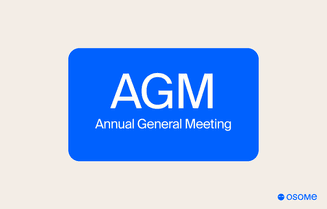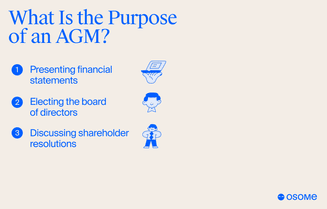Annual General Meeting (AGM) in Singapore: A Complete Guide
- Published: 26 June 2024
- 7 min read
- Grow Your Business


Gabi Bellairs-Lombard
Business Writer
Gabi's passionate about creating content that inspires. Her work history lies in writing compelling website copy and content, and now specialises in product marketing copy. When writing content, Gabi's priority is ensuring that the words impact the readers. As the voice of Osome's products and features, Gabi makes complex business finance and accounting topics easy to understand for small business owners.
Preparing for an annual general meeting (AGM) in Singapore? Understand the mandatory annual meeting where shareholders scrutinise financial performances, influence major decisions, and elect directors. This guide walks you through the legal requirements, practical steps to hold an AGM, and post-meeting responsibilities to ensure you stay compliant and make the most out of your AGM in Singapore.
Key Takeaways
- An AGM in Singapore is a critical platform for corporate democracy where shareholders can scrutinise performance during the financial year, elect directors, and discuss resolutions.
- Companies in Singapore must adhere to strict deadlines for AGMs: listed companies within 4 months after FYE, others within 6 months after the financial year end FYE, and no more than 15 months apart for subsequent AGMs.
- Non-compliance with AGM regulations under the Companies Act risks penalties, potential prosecution, and directorship disqualification, emphasising the importance of timely AGM conduct and filing.
What Is an Annual General Meeting (AGM)?
When the term “annual general meeting” (AGM) is mentioned, it conjures up an image of a pivotal gathering – a mandatory yearly meeting where the financial health and future strategies of a business are laid bare before its shareholders. It’s a democratic process that empowers shareholders to raise questions and express their opinions on the company’s affairs, reinforcing the democratic aspect of corporate governance during annual general meetings, including the annual meeting.
For companies in Singapore, navigating the complexities of organising and executing AGMs can be challenging, but our company secretarial services are here to ensure compliance and smooth operations throughout the process.

While the venue and formality of AGMs may vary, the essence remains the same: they are a bastion of transparency and a platform for accountability, where private companies hold an AGM to scrutinise their performance and hold their directors accountable.
What Is the Purpose of an AGM?
Annual general meetings serve as a cornerstone of corporate democracy, serving as a platform where shareholders’ voices are amplified on significant business matters.
The main reasons to hold an annual general meeting are:
- electing the board of directors
- approving compensation
- making important decisions on mergers and acquisitions
Shareholders exercise their voting rights to shape the company’s direction.

Presenting financial statements
During the AGM, a company presents its financial statements, offering a transparent look at the company’s financial performance over the past year. This presentation includes the annual report, the director’s report, and the auditor’s report, all of which are critical for members who wish to make informed decisions based on accurate financial statements. The annual return serves as a comprehensive summary of these financial statements and reports, addressing any auditor requests that may arise.
The timing of these business presentations is strictly regulated, with non-listed companies needing to submit before the sixth month and listed companies by the fourth month before the AGM to present their reports to stakeholders.
Electing the board of directors
The AGM also hosts the crucial process of electing the board of directors and the company's stewards, involving all the members. All the shareholders use different voting systems to elect directors, with the plurality system allowing the candidate with the most votes to win and the majority system requiring more than half the votes cast.
Proxy votes play a significant role here, as they can sway the results of the elections, emphasising the power of every single vote.
Discussing shareholder resolutions
An AGM is also the setting for discussing shareholder resolutions, which can range from the ordinary to the special. Special notices need to be sent before the AGM to highlight specific proposals members wish to address, ensuring that all relevant topics are given the attention they deserve during the meeting.
When Should a Company Hold Its AGM?
Private companies in Singapore face strict deadlines for holding their AGM. Here are the key deadlines to keep in mind:
- Private companies must hold their AGM within 4 months after the financial year end.
- Other companies have a 6-month due date to hold their AGM after filing at the financial year end.
- The inaugural AGM must occur within 18 months of a company’s incorporation.
- Subsequently, AGMs should be held no more than 15 months apart.
The notice period for an AGM is also regulated, requiring a minimum advance of 14 days for ordinary written resolutions and at least 21 to 28 days for special written resolutions or notices.
Is it Possible To Hold an AGM Virtually?
The traditional notion of an AGM being a physical meeting has evolved in today’s digital age. Virtual AGMs are not only possible but also legally recognised and increasingly common. For such virtual gatherings, companies must implement robust systems to verify member's identity and ensure real-time engagement, including live voting. Additionally, these platforms must provide strong security features to protect shareholder data.
Proxies and Participation
Should a member be unable to attend an AGM in person, this does not preclude them from participating. By appointing a proxy, they can ensure their vote is cast on their behalf and their voice heard even if they are unable to attend. A proxy can represent a shareholder with their approval and vote on their behalf, with various methods available to submit a proxy form, including mail, phone, or online submissions typically up to 24 hours before they hold AGMs.

AGM's Obligations and Consequences
Adherence to statutory obligations surrounding AGMs under the Companies Act is non-negotiable for Singapore companies. Directors are responsible for ensuring that AGMs are held and an annual return is filed on time, with non-compliance attracting penalties and possibly prosecution.
Due to the fact that an AGM is a mandatory event, failure to comply can result in fines up to $5,000 per charge and potential disqualification from directorship in cases of repeated non-compliance. With that said, there are some cases where a company may be exempted from holding AGMs or receive an extension of time.
Preparing Financial Statements
The bedrock of AGM transparency, especially for AGMs in Singapore, lies in the accuracy of the company’s financial statements. These documents, prepared following Singapore’s financial statements standards, are fundamental to presenting a truthful depiction of the company’s financial health.
It is imperative that these statements are prepared promptly after the company’s financial statements are present to ensure the smooth operation of AGMs and the timely filing of an annual return.
Post-AGM Responsibilities
Once the AGM curtain falls, the work is not over. Detailed minutes must be recorded, signed by the chairman, and an annual return must be filed electronically through ACRA’s Bizfile+ system. Failing to present on time can incur penalties, stressing the importance of timely action post-AGM.
It is also crucial for a professional firm to update business particulars, officer information, and company secretary details to meet legal requirements.

AGM's Exemptions and Extensions
Not all companies, including public companies, are bound to the traditional AGM structure. Certain companies, including a specific private limited company, may be exempted from holding AGMs if they meet criteria such as if financial statements are sent within five months after the financial year end or if no members request an AGM. However, if an AGM is requested, private companies must hold one and notify the Registrar accordingly.
An extension of time can be sought for AGM-related deadlines, albeit with a government fee involved and a processing timeframe that must be accounted for. Should approval be granted, a company may be able to deviate from the usual timelines.
Summary
Throughout this guide, we’ve navigated the multifaceted process of AGMs in Singapore, from the importance of timely and accurate financial statements to the legalities and technicalities of virtual meetings. The annual general meeting is not just a procedural formality but a vital mechanism for shareholder engagement and corporate transparency. As we close, it’s clear that understanding and holding AGMs is crucial for any member wishing to be an active participant in the stewardship of their investments.
If you need help with your business's financial responsibilities, we offer expert accounting and corporate secretarial services alongside easy-to-use software and unlimited bookkeeping at Osome. Feel free to reach out to us for professional assistance tailored to your business needs.
FAQ
What is the purpose of an AGM?
The purpose of an AGM is for shareholders and directors to discuss financial performance, elect the board, and vote on important business matters.
Who can attend an AGM?
Shareholders and their appointed proxies, such as a company secretary or employee, are eligible to attend an AGM of a firm on behalf of a member. Non-shareholders may also attend as observers if the general meeting is held virtually and permits it.
Can a private company be exempt from holding an AGM?
Yes, a private company in Singapore can be exempt from holding an AGM if certain criteria are met, such as approval from all members or if the company is dormant.
What are the consequences of not holding an AGM on time?
Not holding an AGM on time can result in penalties, enforcement actions, and possible prosecution for the company. This can have serious legal and financial implications for the organisation.
Can an AGM be held virtually, and are they legally recognised?
Yes, AGMs can be held virtually and are legally recognised as long as they meet specific requirements, including real-time engagement and secure voting mechanisms.
Get expert tips and business insights
By clicking, you agree to our Terms & Conditions, Privacy and Data Protection PolicyWe’re using cookies! What does it mean?






